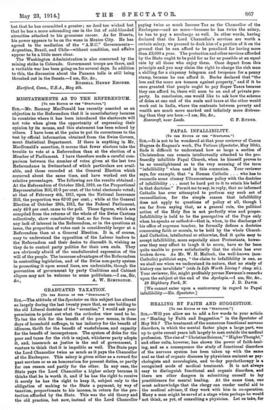MISSTATEMENTS AS TO THE REFERENDUM. [To roe Eorror. or Tex
.SracraToa."]
Sra,—Mr. Ramsay MacDonald has recently asserted as an objection to the Referendum that it is unsatisfactory because in countries where it has been introduced the electorate will not vote when given the opportunity of expressing their opinion by its means, and this statement has been echoed by others. I have been at the pains to put its correctness to the teat by official information obtained from the Swiss Govern. went Statistical Department. If there is anything in Mr. MacDonald's assertion, it means that fewer electors take the trouble to vote at a Referendum than at the election of a Member of Parliament. I have therefore made a careful com- parison between the number of votes given at the last two Referendums in Switzerland of which particulars are avail- able, and those recorded at the General Election which occurred about the same time, and have worked out the relative percentages. The following are the results obtained At the Referendum of October 23rd, 1910, on the Proportional Representation Bill, 61.3 per cent of the total electorate voted; at that of February 4th, 1911, upon the National Insurance Bill, the proportion was 63'03 per cent. ; while at the General Election of October 29th, 1911, for the Federal Parliament, only 48.3 per cent. came to the poll. These figures, which are compiled from the returns of the whole of the Swiss Cantons collectively, show conclusively that, so far from there being any lack of interest in the Referendum, or in the questions at issue, the proportion of votes cast is considerably larger at a Referendum than at a General Election. It is, of course, easy to understand the opposition of the Labour leaders to the Referendum and their desire to discredit it, wishing as they do to control party politics for their own ends. They are obviously afraid of the unadulterated expression of the will of the people. The immense advantages of the Referendum in controlling legislation, and of the Swiss non-party system in promoting it upon sound lines, are undeniable, though the prevention of government by party Coalitions and Cabinet cliques may not be welcome to some politicians.—I am, Sir,














































 Previous page
Previous page